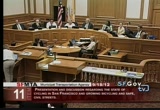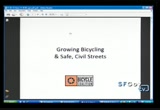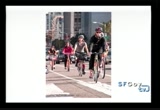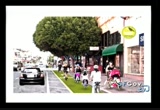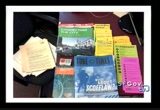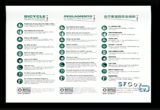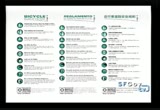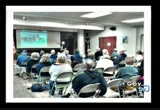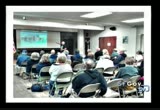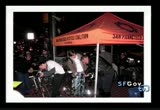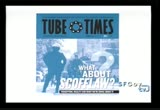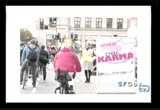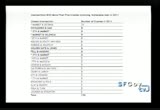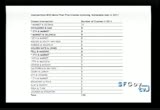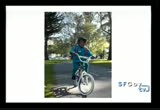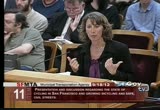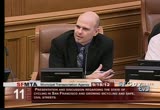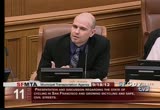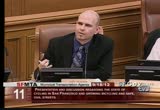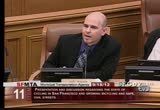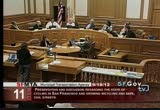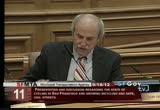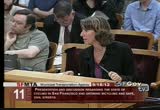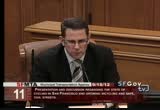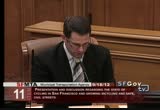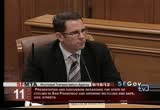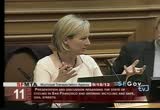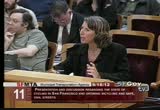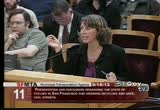tv [untitled] October 2, 2012 8:00am-8:30am PDT
8:13 am
copenhagen were that hope to reach people. we do want to affect people's behavior. we're very excited about doing that the right way. i love your ideas now and later. this is tough to see, i apologize, but it is also in our newsletter. these are the top 20 or worst intersections in the city, for collisions. for vulnerable people being hit and injured. it means people walking and biking in 2011, getting hit and injured. these are injury collisions. i bet these won't surprise you. a lot of them are on market street. number one is market noctavia. these are not surprises. most of them are not new areas of problems. i highlight these to transition to enforcement. as much as we educate and campaign and talk, there is still a role for enforcement. we've been working with the police department and
8:14 am
your agency to focus on smart enforcement. the police surely don't have enough resources to be everywhere every minute. where do you put your energy. we think you should be putting your energy here. if we know these 20 intersections -- they're not all intersections, 20 locations are the worst and the most problematic, are where most people get hurt and should height vulnerable road users, people walking and biking, are 30 times more likely to be hurt at one of these intersections. if we know these are the problem, let's put our enforcement efforts there. i would be happe happy to go there and put our materials out. i would like to see the police department and the m.t.a. efforts focused on these locations. i would like to see you all coming back on an annual basis reporting, and letting them know how it goes. we know these are problem
8:15 am
intersections, might will be a problem with the makeup of the street? possibly see. i'd love to see a report that actually comes back and shows you progress. just like the state of cycling, we don't know if we're doing better unless we track it and unless there is transparency there. in conclusion, i want to bring it back to some points made in selita's presentation. there is a lot we can do. education, enforcement, marketing or promotion, but the leading cause of behavior change when it comes to biking, and that means encouraging more people to bike, and encouraging more people to bike safely and respectfully. the leading change is infrastructure. it is making safer streets. we know from various studies, from berkeley to new york city to copenhagen, there is a far greater reduction in poor behavior when you're creating physically separated bike ways, far more than cracking down on
8:16 am
enforcement or putting stenstencilling on the streets. it is part of a bigger puzzle that we're all working on. but the number one piece that we know makes changes and helps make the little ones ride is having physically safe places to ride. the end goal is a safer, healthier safer san francisco. we want to lower private auto trips, increasing transit, walking and biking. we want to say thank you, and i'm happy to answer any questions now or later. >> thank you. an excellent presentation. directors? >> sure. >> you were part of this trip? >> yes, indeed, i was. i want to extend my gratitude to you, ms. sham, and to you, selita as well. thank you very much for these presentations. i've been really looking
8:17 am
forward to this discussion and acting on the experience that at least i got to have, having ridden a bike in denmark, and speaking from the prospective of a former mammal. i used to run around in the lycra, but got out of that because i didn't feel it was a practical way to bike and really enjoy the more casual speed and approach that is happening in other cities and countries. the thing that i thought was so interesting about the cycling experience in denmark was that it is so regularly -- so many people regularly bike that it is not even seen as a thing. it is a utility. like you putting on your shoes. everybody has got a bike and a pair of shoes. and so many people do it, and i want to reiterate her last point about the protected infrastructure,
8:18 am
and i'm really looking forward to having more conversations about that. but the 35% to our 3.5%, so correct me if i'm wrong, the math there is like 10 to 1 for every one bicyclist, multiply it times 10 on our streets, and that's what it would be like to have a street similar to denmark. i think the way they really do that is these protected cycle tracks and infrastructure, and i'm really hoping we can move these kinds of things forward and really make people feel safe to ride a bike. there are times when it is simply not practical for me to ride a bike, like when i'm dressed like this. right now i don't have one of those great dutch bikes yet, but i mean to get one. and i'm crammed into an enjuta during rush-hour, and i'm looking at these people who aren't wearing this, and i'm thinking, why aren't you biking?
8:19 am
i encourage you to ask those questions. and i think about the relief that having more people biking would be on our system, on our transit system. i guarantee if we get out here at 5:00, i'll be waiting for an end that gets to van nuys that will have space for me to get on. i think about all of that capacity and strain on our system from people not being on bikes. i want to have you folks think about that the additional benefit that wasn't mentioned was that for every bike, there is more parking spaces that are out there. there is also more seats on traffic for people who can't take transit. there is an additional benefit that wasn't even discussed today. so i really do think that we're heading in the right direction. i think that as i'm -- as long as i'm a member of this board, i'll be pushing as hard as i can, and ready to do whatever the community would. however we could move those goals forward to get
8:20 am
to that 2020 ratio that so many people would like to see happen. i really love the reemphasizing good behavior thing. i think that is brilliant, and i cant wai cant wait to see that implemented. when i'm out there on my bike, i feel like the status quo really is to sort of roll through stop signs, unfortunately in some places, like along the wiggle, for example, and that if we do reward the positive behavior, we do change -- we can change that behavior. i would like to put the call out to some of the more artsie types, the call for the better bike rack. i think if you go to denmark and all of the other countries in the netnetherland, they love design. that's why all of the fancy cars are so great
8:21 am
from there, but they have yet to figure out bike racks. so let's get on them and beat them. i'm sure we have the creativity here in san francisco, and we'll be creating some sort of a bike-sharing system that will have them yearning for it. thank you so much. i look forward to doing more of this. >> thank you for the presentation. always great working with you. at the risk of being discuffing the parish picnic, i'm far more interested in the diversion and enforcement. i like to think that all of the positive reenforcement is totally worthwhile, and it is totally worthwhile for us to keep pursuing infrastructure changes, but the behavior has got to change. maybe we're focusing on a very small group that you mentioned, but they cause an awful lot of trouble, and they cause an awful lot of reaction that is really, really negative. i am very interested in seeing how this diversion program works, and i
8:22 am
totally agree with the suggestion that it be in the areas that is most harmful. i'm currently doing some work in the city, and i'm on the mission, and i can assure you every day at least once somebody is riding their bike very fast on those sidewalks. but there isn't a safe alternative. there is not a bike lane on either one of those streets, and the traffic is extremely fast coming off the freeway, down mission, and the other side as well, i noticed down that way. that is something i'd like to take a look at. it is a very dense of populated office space on both sides of mission. you have the department of delta and aging services, and all of the non-profit and for-profit things on the other. and on the other side is the human service agency, lots and lots of people, and it is a very dangerous intersection. i support all of these. i think i supported leah sham. and everything that has been before this body,
8:23 am
involving bicycle improvements. i'm interested to see this thing working, because i have a little more pessimistic view of human nature. we need the thought of being caught and punished. we have a couple of counter-views. >> i don't know if the police department is here today, but they have been doing a lot of enforcement. it definitely gets out in social media. those of us who bike want a lot more enforcement. it is not happening everywhere, but it is happening a lot more than it used to be. >> both pieces need to be done. >> and i'll pick up on that, although i'll talk about more positive things, too. i appreciate the chart about the accidents, and i appreciate the suggestion that that is where we should be focusing, and that makes inherent sense. to pick up on tom's point, and if you want to hand
8:24 am
out danishes to people who do well, i'm not going to stop you. but to pick up on tom's cynicism, if you're a motorist in the city, for example, and you pick up a ticket for a non-life-threatening violation, but a violation nonetheless, a right turn and a no-right turn, you face a very stiff repercussion. you've got a points on your record, and you have to go to traffic school for eight hours. and if you do it within a certain amount of time, you're going to get another hit and you're going to have a hit on your insurance. almost all, if not every driver, in the state knows you really want to avoid a moving violation, even if it is a minor moving violation because there
8:25 am
are severe economic and personal repercussions. my question to is you: what are the repercussions on a person on a bike who gets a ticket. you don't have an expensive insurance policy. you can't kill somebody as easily with a bike, but you can, kind of. so i guess what i'm going to get at is just to leave it to you to answer the question for me, which is: what are the repercussions, and have we done enough to make them serious, and to educate people as to what they are? >> that's a great question. i think there is some confusion around this. first of all, for most infractions -- it's called basic moving violations, it is the same fee. so if i run a red light on my bike, versus run a red light on the car, to put it in monetary terms, for a second, a lot of people are surprised to hear that. i forget the amount personally, but i just got
8:26 am
an "x" hundred dollar ticket for running a red light and i was on a bike. whether in a car or on a bike, you get the same infractions, for the most part. the biggies that i've heard about. so there is the monetary piece. and that is, i think, what stings people, often, the most. >> but my point is motorists face a lot more because there is the whole insurance angle of it. which is, in many ways, the most significant stick for people to not mess up. so my question to you is to focus a little bit is, i'm glad we're making people aware they'll pay the same fine. but do we need any sort of changes with respect to licensing or mandatory insurance, or something, that will create, as tom says, even greater disincentive so people are as weary of violations as i think drivers are. >> i'm sorry, can i leap in? there are a couple of things that are concerning me right now.
8:27 am
one is that i feel it is not fair of us to put the onus on the bike coalition to answer for or correct the bad behavior of cyclists. leah has already pointed out it is not the bike coalition members who are likely the problems, because the bike coalition nobodiemembers are the ones who are interested in increasing biking and solving these problems. are we calling the a.a.a. in to answer for all of the bad car driver behavior? >> i'm not asking leah to apologize or to condone these people. all i'm asking is: do you think there are legislative changes we can make so people will realize the repercussions of their actions so they're less likely to do it. i apologize to cheryl and you if i sounded like you're members are rolling red lights. i'm asking is there something we can do to
8:28 am
8:29 am
that wasn't right. people on bikes get caught a lot easier than people in cars. and i don't mean to do an either/or, but we literally just heard from a police officer on market street. you're here ticketing bicycles. is there some interest in that. i didn't get stopped, but i wanted to ask what was encouraging this. i wasn't critical. he said bikes are
128 Views
IN COLLECTIONS
SFGTV: San Francisco Government Television Television Archive
Television Archive  Television Archive News Search Service
Television Archive News Search Service 
Uploaded by TV Archive on

 Live Music Archive
Live Music Archive Librivox Free Audio
Librivox Free Audio Metropolitan Museum
Metropolitan Museum Cleveland Museum of Art
Cleveland Museum of Art Internet Arcade
Internet Arcade Console Living Room
Console Living Room Books to Borrow
Books to Borrow Open Library
Open Library TV News
TV News Understanding 9/11
Understanding 9/11